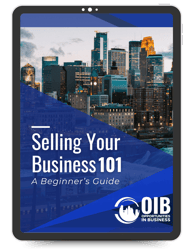Ready to Sell Your Business?
We can help.
The problem is, you’re not sure what your business is worth or how to market it while maintaining confidentiality.

As a business owner, you’ve put everything you have into building your business. You deserve to sell it for top value. The problem is, you’re not sure what your business is worth or how to market it while maintaining confidentiality.
You don’t have to know it all. You just need a business broker who does.
We’ll help you determine what your business is worth in the current market, and work to ensure you get top value for your investment.
We’ll help you find qualified buyers while maintaining strict confidentiality.
Our brokers have all been where you are and know how to bring you through the sales process for a successful exit.
That’s why we’ve helped thousands of business owners broker their businesses successfully, and we’d love the chance to do the same for you.
Schedule a no-obligation meeting to discuss your needs and desires for your business sale.
We’ll determine what your business can sell for and develop an effective strategy to market it while maintaining confidentiality.
Pop the cork and celebrate the successful sale of your business and the culmination of all your hard work!


Thumbs up. OIB guys do their work well. Dozens of emails and calls with potential buyers. When we found one, they helped enormously with the details and negotiations for the sale. I worked with Rick Willard and Mac Thelen. They're a good team.


Mac was such an asset in helping us navigate all the details needed to sell a business. He was always available to help with any questions we had. I would highly recommend enlisting his team if selling your business is your goal!

Working with Opportunities In Business was a wonderful experience. Peggy was always available to help me with all my questions and needs. Peggy made selling easy and positive decision.

Jim Evavold was our Realtor who helped sell our Business. Very professional and go getter. Always in communication and worked very hard until we got our Business sold. We were so very fortunate to have found him and work with him. Highly recommend him!

Charles Durkin with Opportunities In Business helped us purchase an existing business...He was friendly and very helpful with making sure we were asking all the right questions and everything else. I'm not sure we would have continued looking for businesses to buy had we not found Charles.
.png)
Bill Kraemer helped sell my family's business of 42 years and was great to work with. Bill was extremely responsive, even if he was on vacation, he always responded letting me know when he was available. Business didn't stop after 5pm. Even after the sale, Bill was willing to listen and help be a sounding board for another business venture I was contemplating.
I have used other broker's prior to knowing Bill. Compared to the others, my only regret was not having met Bill sooner.
If you are looking for an experienced straight-forward broker, I would high recommend Bill. I have referred him to friends and family looking to sell or valuate their business.

We went to Bob 22 years ago looking for a printing company to buy, and he found us the perfect one. 22 years later we still own the company, and we still consider Bob a trusted adviser. (We've also gotten to know Tom and Peggy, and they great as well!)
UPDATE: In 2021 we reached out to Bob to handle an inquiry from a party interested in buying our business. Ultimately we determined that buyer wasn’t a good fit, but Bob and his co-worker Jim Evavold quickly found the people that were the perfect fit – they paid a fair price, left the soul of our business intact, and had the energy to take it to the next level.
We could not be happier with Bob (and Jim!) and would recommend them (and Tom and Peggy!) to anyone looking to buy or sell a business!
![]()
Right from the start of working with us to sell our business, Bill Kraemer aimed to put our company in the forefront and keep it there. He kept us updated on the status of requests coming in throughout the entire process, always returned calls quickly, and provided answers and possible solutions to achieve our end goal in the most advantageous way for everyone. He worked ambitiously for us every step of the way!"
![]()
Jim did a great job selling 10 of our gas/convenience stores with commercial property in Minnesota. Also has a great buyer lined up for our red wing store."
![]()
Peggy is great to work with. She's very knowledgeable with what needs to be done. Sold one of my locations in a short time. Would highly recommend."
![]()
Mac was such an asset in helping us navigate all the details needed to sell a business. He was always available to help with any questions we had. I would highly recommend enlisting his team if selling your business is your goal!"
![]()
When first starting to look into a broker to sell my business I had started working with large broker firms. They undervalued my business to the point that the assets were more the the value the assessed. Charles worked very hard to get a proper evaluation that he and I felt comfortable with. Charles also worked hard with buyers to help them through the process even though he wasn't representing them. In the end I was able to sell my company for 40% more than other broker companies were willing to evaluate at. Couldn't be happier with the whole experience."

At OIB, we know you’ve put a lot of blood, sweat, and tears into your business, and we believe you ought to be able to sell it for top value so you can enjoy the freedom you have worked so hard to earn. Our business brokers have all been in your position, so we understand how stressful selling a business can be. We’ve helped thousands of business owners broker their businesses successfully, and we can do the same for you.
Get our beginner's guide to learn what it takes to sell a business successfully, how to avoid common pitfalls, and to help you make more confident, informed decisions.
